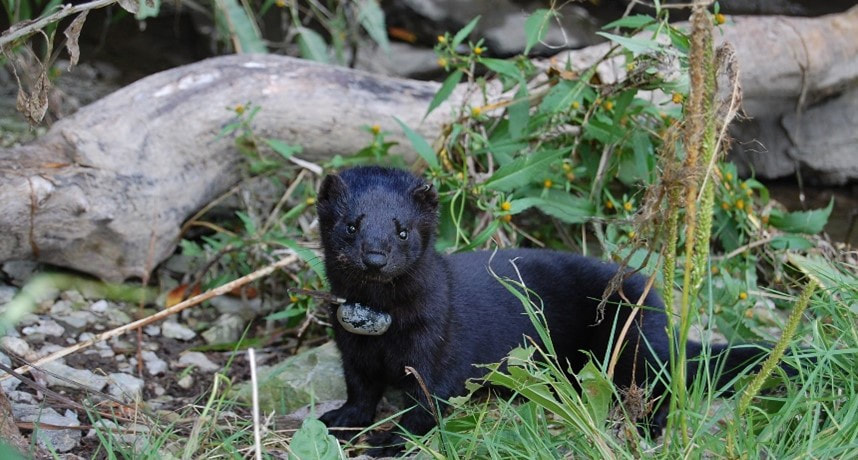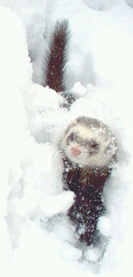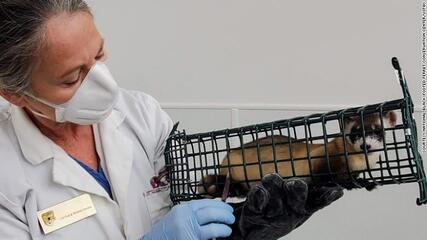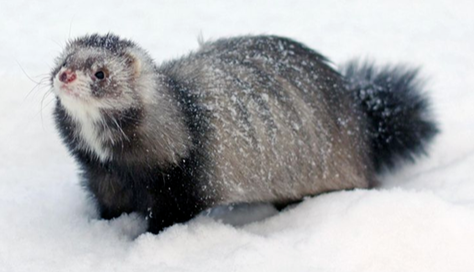Covid-19 at Wisconsin mink farming industry  Jan 30, 2021: Last October, not the usual flu virus was seen in the mink at two Wisconsin mink farms located in Taylor County. Mink of all ages and fur coat colors stopped eating, followed by coughing, sneezing, tiredness (lethargy), and then labored breathing. For the next few days hundreds of mink died, in the end, totaling about 5,500 animals. Within a week, after ranchers thought that most of the mink were going to die, the contagion suddenly stopped. Veteran mink expert, Hugh Hildebrandt stated: “... the next morning.....it’s just stopped. They all start eating. They eat more than they ever did before.” So far there is no evidence in the US, that infected mink can transfer the virus to humans. Even so, there is concern among scientists that mink could harbor a variant of the virus that causes COVID-19 in humans. As a result, the state added mink farm-workers to the category of residents next in line for vaccination against Covid, along with teachers, child-care workers and grocery store employees. In August 2020, Utah was the first state in the US to see farmed mink infected with the virus. This resulted in a nationwide search for infected wildlife. In mid-December a wild mink trapped near a Utah mink farm was confirmed to have the virus. “To our knowledge, this is the first free-ranging, native wild animal confirmed with SARS-CoV-2,” said Thomas DeLiberto and Susan Shriner of the USDA’s Animal and Plant Inspection Service. Soon after that, two more mink — both Oregon farm escapees — also tested positive.
Are mink better at pandemics than humans? Experts state that wild mink “socially distance very well.”
Source: https://www.channel3000.com/wisconsins-no-1-mink-farming-industry-now-seen-as-a-covid-19-risk/ Protect your Ferrets from Frostbite and Hypothermia Ferrets are fur-bearing mammals. Ferrets can handle cooler temperatures better than warm weather. Even so if your ferret is usually housed indoors, their undercoats will be thinner in Winter, than those of ferrets that live outdoors all year round. Although your pet ferrets have fun playing in the snow, they must be protected from over exposure to the cold which can result in “hypothermia.” What is hypothermia? Hypothermia is abnormally low body temperature. It occurs when your ferret rapidly loses body temperature due to the sudden and extreme cold. Signs of hypothermia:
What is "frostbite": “Frostbite” is caused by injury to the skin due to cold temperatures. As frostbitten tissues thaw, they may become red and very painful due to inflammation. In animals changes due to frostbite can take days to appear, especially if the affected area is small or on non-weight bearing areas, such as the tip of the tail or ears. Signs of “frostbite:”
Indoor Ferrets In the United States and Canada, most ferrets are kept indoors. If so, there fur will not reach the thickness needed to protect them from cold temperatures (less than 50 degrees F/ 10 degrees C). How long can my ferret play outside in the Winter? Limit your ferret’s exposure to cold winter temperatures and snow to not more than 10 to 15 minutes, although smaller ferrets may be less tolerant to the cold. DO monitor your ferret closely for signs of shivering, and bring her inside. DO NOT expose your ferret to freezing and subfreezing temperatures. Outdoor Ferrets Keeping domestic ferrets outdoors is NOT recommended for a variety of reasons. When kept outdoors, they must first become accustomed to the environmental temperatures over months. Even so, all animals must be kept in secure enclosures (sheds, etc.) from which they cannot escape. They must be protected from wind, rain, and cold temperatures, and in the summertime from sun and heat. In such cases, ferrets must have warm bedding and are generally housed together for warmth. Water and food must be checked frequently, to avoid freezing and insect infestation. For more reading:
Endangered Black-footed Ferrets receive Covid-19 vaccine  US Fish & Wildlife vet inoculates BFF against Covid-19. US Fish & Wildlife vet inoculates BFF against Covid-19. In summer 2020, endangered black-footed ferrets (BFFs) were injected with the then experimental vaccine for Covid-19 slated for human use. Testing was conducted in the captive BFF population at the National Black-footed Ferret Conservation Center near Fort Collins, Colorado. To date no BFFS have tested positive for Covid. Testing was initiated not only to protect the highly endangered wild BFFs, but also potentially to protect humans, should the animals become infected. Minks – both farmed and wild- were found to test positive for Covid in both Europe and North America. In recent months the mink tested positive for the mutated strain of the virus, initially identified in the United Kingdom. The concern comes from BFF’s genetic similarity to other mustelids, such as mink. Mink not only contracted the illness, but also passed it on to humans, causing several EU countries to dispose of entire colonies of farmed mink, in the millions. The wild BFFs are native to the North American prairie. Their range, once spanning the vast American West, was reduced as humans exterminated the prairie dog populations, which is the BFF’s primary food source. By early fall 120 of the 180 ferrets housed at the center were inoculated, with the rest remaining unvaccinated in case something went wrong with the animals. So far, the vaccinated BFFs appear healthy, and tests show SARS-CoV-2 antibodies in their blood. However, there is no data to show whether the vaccine actually protects against the disease. Efficacy studies in domestic ferrets are still pending. Source: https://www.cnn.com/2020/12/23/health/black-footed-ferret-covid-vaccine-scn-partner/index.html |
Details
Archives
April 2024
Categories
All
|
|
Terms and Conditions
|
allFerrets® 2014-2024. ALL RIGHTS RESERVED.
Proudly designed by widgIT |




 RSS Feed
RSS Feed
